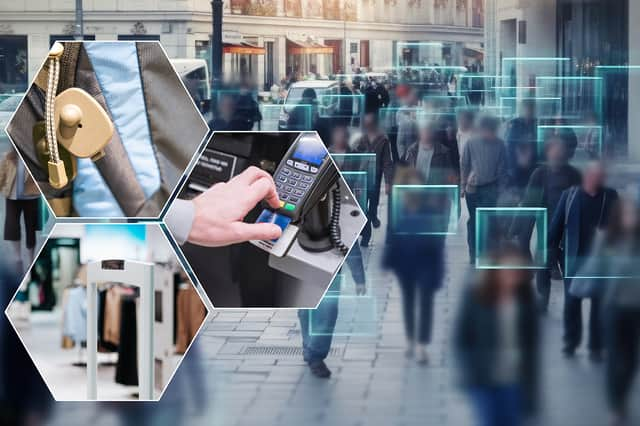The eight rules that stores have introduced to prevent shoplifting explained - including Project Pegasus
This article contains affiliate links. We may earn a small commission on items purchased through this article, but that does not affect our editorial judgement.
and live on Freeview channel 276
Shoplifting is an issue that plagues many shops on the high street, including small independent stores and big chain stores. It’s a problem that has likely been around as long as shops themselves, but it seems to be getting worse, partly due to the cost of living crisis and inflation.
It’s also being aided, over the years, by new technology. For example, TikTok is now being used by shoplifters to share their tips and tricks for stealing items successfully - although anyone considering following these tips has been warned that there will be consequences.
Advertisement
Hide AdAdvertisement
Hide AdMatt Vickers, deputy chairman of the Conservative Party and a former employee at Woolworths and Home Bargains, told The Times: “Many of the ‘creators’ behind these TikTok’s are misleading their audiences into believing that stealing from a big company has no repercussions. The loss of stock leads to a price hike on the shelves, leaving the everyday customer paying for the losses.”
Shop owners and the government have introduced various measures in the last year to try to combat theft from stores and help shop owners’ protect their stock and their livelihoods. This does include using advances in technology to their advantage also.
The most recent of these measures is Project Pegasus. Various big name stores, including Tesco, Sainsbury's, Waitrose and the Co-op are among those who are going to take part in the scheme, which will see them pay police to scan shoplifters' faces through the Police National Database, which uses facial recognition technology. It is hoped that by joining together in this project, the stores will all see a reduction in the number of thefts of products from their shelves.


‘Shoplifting has become decriminalised’
Amid the on-going cost of living crisis, higher value everyday items, such as butter and cheese has started to be tagged or locked behind cabinets in an attempt to prevent them being taken. In some cases, empty packaging for basic items such as tins of coffee have been placed on shelves and people have to take this to the checkout to be given the real product.
Advertisement
Hide AdAdvertisement
Hide AdRetailers such as Co-op are also bringing in security guards to try to deter thieves, and in some shops electronic barriers have also been installed at self service checkouts to make it difficult for offenders to flee from the checkout area. In August, Aldi also introduced a new rule which sees bag checks being carried out by security guards in a further attempt to combat shoplifting.
In July last year, new technology was introduced at self-service tills which can detect when an item in the bagging area is different to one scanned and can spot other suspicious patterns. People have also long been stopped at the doors of supermarkets and other stores who employ security guards if the store alarm goes off, or the guards have reason to believe they may have stolen goods.
But, despite these measures being introduced, Lord Stuart Rose, the chairman of Asda, said earlier this month that he believes shoplifting has almost become "decriminalised". "It's actually just not seen as a crime any more," he told LBC, adding they believe police have "lots of other things to do". He added: "We should make it very clear to people coming in to shop that if we do catch them stealing things we will prosecute them if we can and it's become a bit of a game.”
Tougher penalties for offenders
Just last month, the government also introduced a plan for bringing in stricter penalties for shoplifters. The new plan will see those arrested for repeated shoplifting offences face mandatory jail time. Government sources have said that under the plan, which is still in its early stages, a custodial sentence for shoplifting will be triggered for repeat offenders who commit between 10 and 20 incidents.
Advertisement
Hide AdAdvertisement
Hide AdIt’s not just shoplifting problems that retail workers have to contend with either. Workers also face abusive behaviour from some shoppers, including those they have stopped because they suspect their behaviour to be suspicious. With this issue in mind, a new law was introduced last year to help protect workers.
From May 2022, common assault against anyone working in a retail environment was classed as an aggravated offence, which carries tougher penalties, under the Police, Crime, Sentencing and Courts Act.
The National Federation of Retail Newsagents national president Narinder Randhawa said at the time: “Attacks against store owners and their staff have been increasing for a number of years, so I am pleased that we are now being given the same protection in law as other frontline workers. Being attacked verbally or physically while just going about your daily business should not be tolerated and seen as part of the job.”
Grocer Iceland also commented that “the majority of violent incidents” their staff were subjected to relate to shoplifting.
Comment Guidelines
National World encourages reader discussion on our stories. User feedback, insights and back-and-forth exchanges add a rich layer of context to reporting. Please review our Community Guidelines before commenting.
